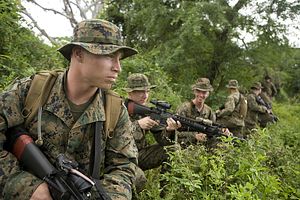On July 21, the United States and Indonesia concluded the latest iteration of a marine tactical warfare simulation exercise.
The United States and Indonesia share a military relationship that has included the standard range of interactions including visits, exchanges, and regular exercises since restrictions in place in the 1990s were lifted under the George W. Bush administration. Functional cooperation also runs the gamut, with Indonesia being an important actor to engage on issues ranging from the Islamic State to the South China Sea as I have detailed previously (See: “Trump’s Indonesia Challenge Begins with Pence Visit”).
These interactions Indonesia has with the United States have been continuing through this year, including with the U.S. Marine Corps (USMC). Just earlier this month, marines on both sides held a Military Decision Making Process Subject Matter Expert Exchange (MDMP SMEE) at the 3rd Marine Corps Battalion Gedangan in Sidoarjo, East Java.
Back in May, the Indonesian Marine Corps (KORMAR) of the Indonesian Navy (TNI-AL) and the U.S. Marine Corps in the Pacific (Marine Forces Pacific or MARFORPAC) held a training session at Baluran Marine Corps Combat Training Center in Karangtekok, Situbondo in East Java. At the time, commander of the Indonesian Marine Corps had said that a series of exercises would be held between the two sides up to the peak in August 2017.
The Marines Tactical Warfare Simulation (MTWS) is one of a range of simulations used by the USMC in engagements with partner countries, including Indonesia. MTWS supports training across a full spectrum of operations – from peacekeeping and disaster relief to high intensity combat, and it typically occurs for around five days, with an exercise consisting of exercise planning and scenario development, operator training, and the exercise itself.
Last Friday, the two sides wrapped up the latest iteration of these drills. According to Indonesian state news agency Antara, the ceremony was brought to a close at Bhumi Marinir in Gedangan, Sidoarjo, East Java, by acting Commander of Marine Corps, Colonel Nanang Saefulloh, who represented the commander of the Marine corps, Brigadier General Lukman, S.T., M.Si (Han).
According to Saefulloh, apart from the command post exercise, participants took part in a series of activities that included “planning, management, coordination, and decision-making process to soldiers mobilization simulation, in an integrated manner.”
The exercise also included ways to handle the impact of natural disasters such as earthquakes, tsunamis, and volcanic eruptions, which was consistent with its typically ‘full-spectrum’ nature.
“This exercise is important to forge cooperation and mutual understanding in military planning process between the two countries,” he reportedly said.
































